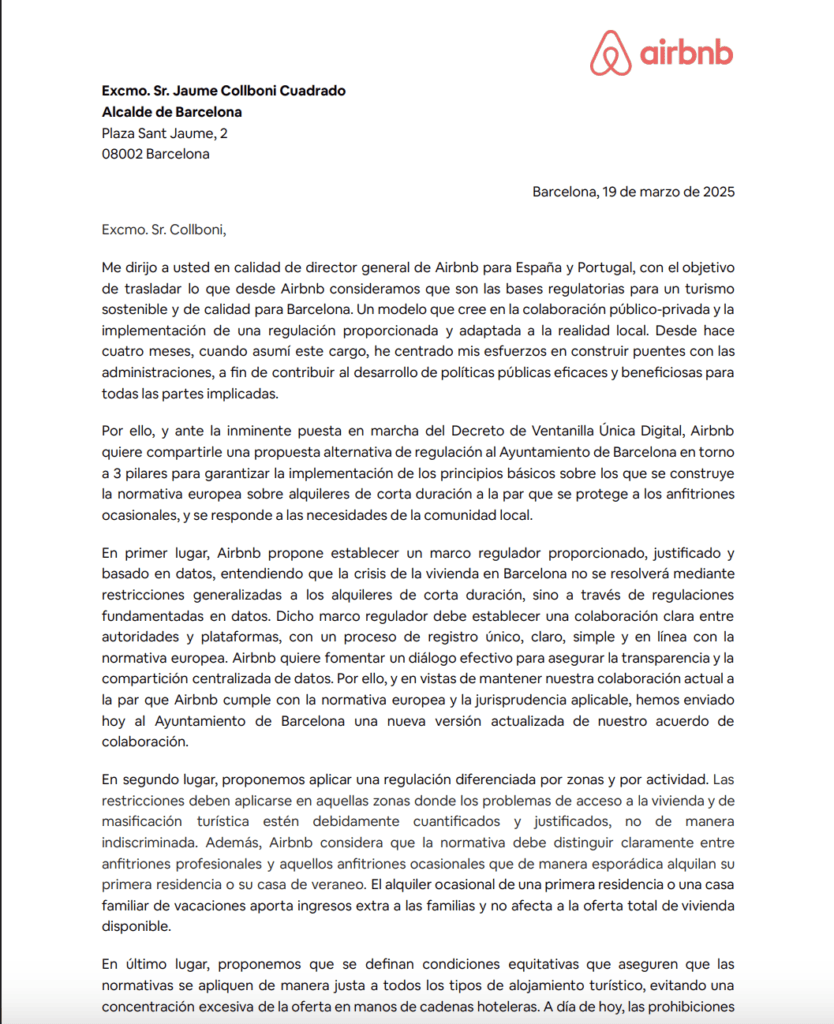In a landmark March 2025 decision, Spain’s Constitutional Court has upheld Barcelona’s plan to phase out all short-term rental (STR) licenses by 2028. The ruling dismissed claims that the ban violates private property rights and grants the city full legal authority to eliminate its 10,000 licensed tourist apartments.
For professional short-term rental managers, this decision underscores the importance of long-term planning, market diversification, and active participation in shaping the future of regulations—both locally and across Europe.
A Court-Backed Mandate to Reshape Tourism
Barcelona has confirmed that it will no longer issue new STR licenses and will not renew existing ones. By November 2028, all current tourism licenses are expected to have expired.
Mayor Jaume Collboni has described the court’s ruling as one that “strengthens, affirms, and provides legal assurance” to the city’s strategy. Authorities cite housing pressures—rents in the city have risen over 60% in the past 10 years—as a central reason for the measure.
Read more: Barcelona’s Short-Term Rental Ban Faces Legal Challenges: What Managers Need to Know
Timeline: How We Got Here
- 2014 – Barcelona imposes a moratorium on new STR licenses to rein in growth.
- 2022 – Catalonia passes a decree empowering municipalities to regulate holiday rentals.
- June 2024 – Mayor Collboni announces plan to phase out all 10,000 STRs by 2028.
- November 2024 – Airbnb responds with a proposal for a differentiated, data-driven framework.
- March 2025 – Spain’s Constitutional Court upholds the ban, dismissing property owner appeals.
Airbnb’s Regulatory Response: Differentiation, Data, and EU Alignment
In a March 2025 letter to the Mayor of Barcelona, Airbnb proposed an alternative regulatory model it says could better balance housing access with economic opportunity. Key pillars of the proposal include:
- Data-Based Regulation
Targeting restrictions only in areas with proven housing strain or tourist saturation. - Host Classification
Differentiating between professional hosts and occasional ones who rent out their primary residence or vacation home. - Fair Conditions Across Accommodation Types
Advocating for equitable treatment between STRs and traditional hotels. - Zone-Based Flexibility
Applying regulation differently depending on neighborhood characteristics. - EU-Level Collaboration
Aligning with the EU’s new digital STR rules and referencing partnerships in Ibiza and Murcia as examples of local adaptation.
While the proposal has not swayed Barcelona’s leadership, it reflects broader regulatory trends across Europe. The platform’s call for data-driven policymaking echoes the recently finalized EU STR data-sharing agreement, which seeks to bring transparency and consistency to the sector.
What Professional STR Managers Should Do Now
With a clear legal timeline in place, professional STR managers operating in Barcelona should begin assessing their options. Here are three key strategies:
1. Pivot to Mid-Term or Long-Term Rentals
Focusing on rentals of 32+ days enables compliance while tapping into stable demand from digital nomads, students, and business travelers.
Related read: Should You Add Mid-Term Rentals to Your Short-Term Rental Portfolio in 2025?
2. Explore Opportunities Beyond Barcelona
Municipalities outside the city, as well as other European destinations, may offer more accommodating regulatory frameworks. Diversification helps reduce reliance on a single high-risk market.
3. Engage in Regulatory Dialogue
Industry-wide engagement is crucial. The European Holiday Home Association (EHHA) has submitted a formal complaint to the European Commission over regional STR bans. Professional managers have a role to play in shaping policies that reflect operational realities while supporting local housing needs.
Who Could Benefit from the STR Phase-Out?
Barcelona also plans to introduce 5,000 new hotel beds, primarily outside the city center, while maintaining a cap on new developments in saturated areas. As a result, several groups may find new opportunities:
- Traditional hotels, which will face less competition in the tourist accommodation market.
- Serviced apartment operators and corporate housing providers, who are already positioned for longer stays.
- Local landlords, particularly those open to working with professional operators on mid-term rental strategies.
However, the actual impact will depend on factors like enforcement, guest preferences, and market dynamics. Data-driven analysis will be essential in understanding these shifts.
A New Phase for Urban Tourism Regulation
Barcelona’s approach may be the most aggressive in Europe, but it’s not isolated. Cities like Amsterdam, Florence, and Lisbon continue to explore ways to balance tourism with livability. Barcelona’s move could serve as a test case for what happens when a city prioritizes housing over STRs at scale.
In 2023, short-term rentals contributed €19 billion to the EU’s GDP and supported more than 300,000 jobs, according to Oxford Economics data commissioned by Airbnb.
Final Thoughts
Barcelona’s ruling brings legal clarity but raises strategic questions for professional managers. The next three years will require adaptation, diversification, and proactive engagement with regulators.
Whether or not other cities follow suit, one thing is clear: the rules of urban short-term rentals in Europe are shifting. Professional STR managers who stay agile, informed, and involved will be best positioned to navigate the road ahead.





![Trump-Era Policies Fuel Travel Uncertainty: Fewer Canadians, Europeans to U.S.—Fewer Americans to Europe [Early Data]](https://www.rentalscaleup.com/wp-content/uploads/2025/04/Trump-Era-Policies-Fuel-Travel-Uncertainty-Fewer-Canadians-Europeans-to-U.S.—Fewer-Americans-to-Europe-Early-Data-150x150.jpg)



